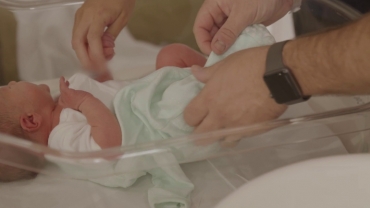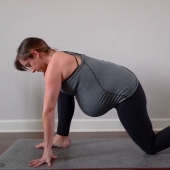When you're expecting, you're not just eating for two – you're living for two. Here's how to have the healthiest pregnancy possible. Staying healthy while pregnant is important not only for your physical and mental well being, but also for your growing baby's.
Health is a combination of a number of making lifestyle changes, getting proper nutrition, exercising regularly, and avoiding unhealthy/dangerous activities. By making changes to be the healthiest you possible, you'll significantly improve the health of your fetus and future child.
Warning: These are basic guidelines. Your obstetrician should be your main source of information for any questions regarding your pregnancy.
Step 1: Stop smoking
If you smoke, stop. Immediately. If it's going to take more willpower than you have to go cold turkey, ask your doctor about chewing nicotine-replacement gum or using the patch, which are both generally considered safe during pregnancy.
Step 2: Take prenatal vitamins
Take a daily prenatal vitamin. This should cover all your nutritional bases, so don't be tempted to pop additional supplements. Too much of certain vitamins and minerals can be harmful to your baby.
Tip: Having trouble keeping that pill down? Until your morning sickness subsides, try taking it with food. Or ask you doctor about a chewable, which might go down more easily.
Step 3: Eat a varied diet
Eat a varied diet that includes plenty of fruits and vegetables, lean meats and poultry, whole grains, and healthy fats, like those in olive and nut oils.
Step 4: Gain weight gradually
Gain weight slowly. For average-size women, that means two to four pounds the first trimester, and about one pound per week after that, for a total of anywhere from 15 to 35 pounds. Underweight women should gain up to 40 pounds, and women who are overweight should gain between 15 and 25 pounds total.
Tip: If you're gaining too quickly (or not enough) talk to your doctor about adjusting your diet and activity level.
Step 5: Stay active
Stay active. Regular exercise can make your labor and delivery easier. If you already work out, keep it up. A brisk walk several times a week is a good start.
Tip: You may need to alter your fitness routine as your pregnancy progresses. After the first trimester, don't do exercises that require lying on your back.
Step 6: Avoid the litter box
If you have a cat, have someone else change the litter box and, if you can, keep your kitty indoors. Also, don't handle hamsters, mice, guinea pigs, or other pet rodents –they can spread harmful diseases to you and your baby.
Step 7: Check your meds
Check with your doctor before taking any over-the-counter medication – even aspirin. And make sure they know about any prescription drugs you're already on, in case you're taking something that could harm your baby.
Step 8: Avoid stress
Reduce stress as much as you can. Do whatever it takes to relax, from long walks to long soaks in the tub, from yoga to meditation. It'll be a while before you can take it easy again!
Did You Know?
The average human pregnancy lasts for 266 days. The average pregnancy for an Asian elephant is 640 days.
- 51 views













